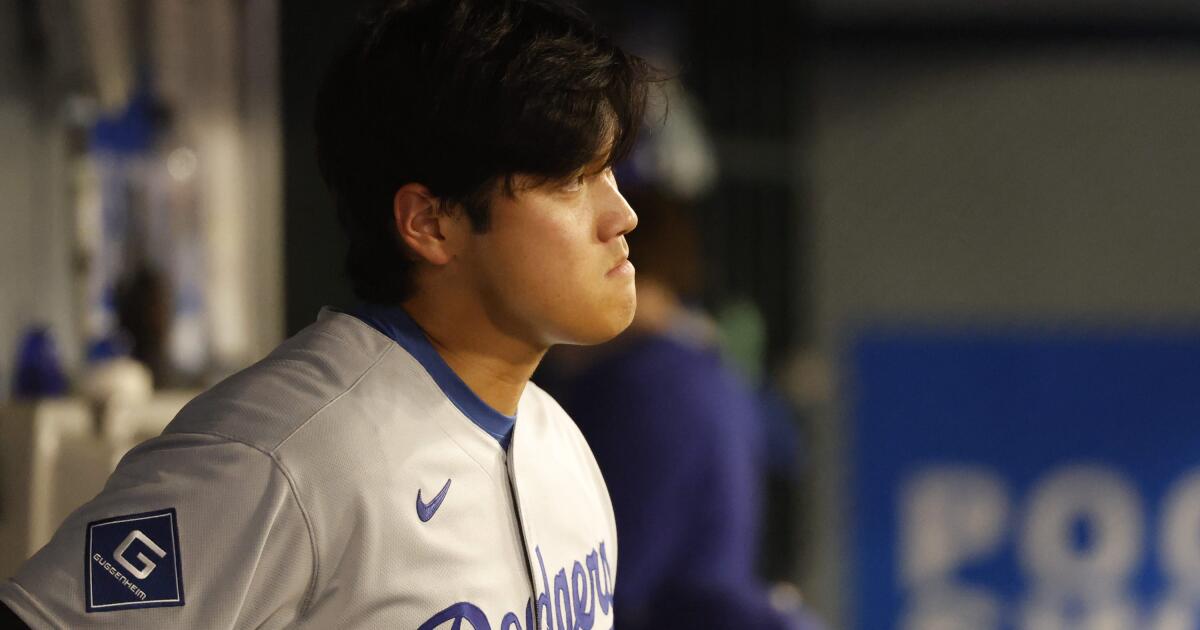Shohei Ohtani’s name is in headlines again.
And, for the second time in two years, not for baseball reasons.
News emerged this week that Ohtani, the Dodgers’ two-way star and reigning National League MVP, was being sued along with his agent in Hawaii by a real estate investor and broker.
The claim: That Ohtani and his representative, Nez Balelo of Creative Artists Agency, had the plaintiffs fired from a $240 million luxury housing development that Ohtani had been contracted to help endorse.
The contours of the case are complicated; relating to contract law, tortious interference and two years of alleged disputes between Balelo and the plaintiffs, developer Kevin J. Hayes Sr. and real estate broker Tomoko Matsumoto, leading up to their termination from the project.
But as it pertains to Ohtani and this current Dodgers season, only one question really matters:
Will the situation create any distraction for him off the field?
When pressed on that Wednesday, he quickly shut the idea down.
“I’m focused on what the team is doing,” Ohtani said through interpreter Will Ireton. “And doing everything in my power to make sure we bring a W on the field.”
According to the lawsuit, Hayes and Matsumoto reached an endorsement deal with Ohtani in 2023 for their luxury housing development on Hawaii’s Big Island. The Japanese star was not only to be a spokesperson for the project, but also a resident committed to purchasing one of the development’s 14 residences as an offseason home.
However, the lawsuit claimed, Balelo increasingly demanded unspecified concessions (the details of which were redacted in the filing) over the last two years from Hayes and Matsumoto — becoming what it described as a “disruptive force” who “inserted himself into every aspect of the relationship.”
Last month, the lawsuit alleged, Balelo went to Hayes’ and Matsumoto’s business partner, Kingsbarn Realty Capital, and threatened litigation if the two weren’t terminated from the project.
“Kingsbarn openly admitted … that Balelo had demanded the terminations and that they were being done solely to placate him,” the lawsuit said. “Specifically, Kingsbarn acknowledged that Balelo had threatened to drag Kingsbarn into a separate lawsuit unless it terminated Hayes and Matsumoto.”
The lawsuit also claims that Balelo’s supposed threat of litigation — which pertained to the use of Ohtani’s name, image and likeness rights being used to promote a seperate real estate project on Hawaii’s Big Island — was “baseless,” amounting to an “abuse of power” by Ohtani’s longtime agent to “force a business partner to betray its contractual obligations and strip Plaintiffs of the very project they conceived and built.”
A Kingsbarn spokesperson told The Athletic this week that the allegations “are completely frivolous and without merit,” and that “Kingsbarn takes full responsibility for its actions regarding Kevin Hayes and for removing Tomoko Matsumoto as the project’s broker.”
Ohtani’s direct involvement in the dispute appears limited.
According to a person with knowledge of the situation who wasn’t authorized to speak publicly, the plaintiffs dealt almost exclusively with Balelo, who has represented Ohtani since he came to the major leagues from Japan before the 2018 season.
Still, because Balelo was acting on behalf of Ohtani, the superstar was included as a defendant as well.
That means — just like in March 2024, when scandal swirled around Ohtani after his former interpreter was found to have stolen money from his bank accounts to pay off illegal gambling debts — Ohtani has another potential disturbance to navigate off the field.
Granted, Ohtani hardly seemed affected by last year’s controversy, helping the Dodgers win the World Series while winning the third MVP award of his career. And this current lawsuit, according to attorney and legal expert Arash Sadat of Mills Sadat Dowlat LLP, presents a much more standard type of legal dispute often seen around real estate deals.
“This kind of stuff happens all the time,” Sadat said. “They’re not rare at all.”
Sadat noted that, based on the lawsuit, it’s not clear “what Shohei knew and didn’t know” when it came to Balelo’s alleged interactions with the plaintiffs.
“All of the allegations in the complaint relate to conduct by his agent,” Sadat said. “If the plaintiffs in this case could show any direct involvement by Ohtani, you can bet that would have been included in the complaint.”
If the case were to proceed without a resolution, it is possible Ohtani could eventually be required to give a deposition detailing his knowledge of the alleged events.
That, however, is not something that would happen imminently. And even if it did, Sadat added, it’s unclear whether his testimony would even be released publicly, given that large swaths of redactions in the original lawsuit of seemingly proprietary business information.
Sadat speculated the chances of the case ever going to trial as slim. The overwhelming majority of such lawsuits are typically settled or dismissed well before then.
“Real estate tends to bring out emotions in people,” Sadat said. “You have a high-profile real estate developer. You have a high-profile real estate agent. You have a sports agent over at CAA. You’re talking about big egos here. And when that happens, and someone feels slighted, oftentimes… litigation is the result.”
